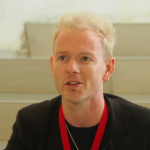
People
Find out more about our staff.
Head of Discipline

Professor Daniel McCarthy
Professor of Sociology and Head of Discipline
Academic staff
Dr Maria Adams
Associate Professor in Criminology

Dr Dimitris Akrivos
Lecturer in Criminology

Dr Giulia Berlusconi
Lecturer

Thi Bogossian Porto
Associate Tutor

Professor Ian Brunton-Smith
Professor of Criminology and Sociology

Dr Sarah Bulloch
Teaching Fellow

Professor Kate Burningham
Professor

Professor Ranjana Das
Professor

Amanda Eastell-Bleakley
Managing Editor, Ethnic and Racial Studies journal

Dr Venetia Evergeti
Associate Professor in Sociology and Associate Head of School (Education)

Professor Jon Garland
Professor of Criminology

Professor Nigel Gilbert
Professor of Sociology

Dr David Griffiths
Senior Lecturer and Director of Studies

Keeley Harvey
Forensic Lecturer

Dr Peter Hemming
Senior Lecturer in Sociology

Professor Christine Hine
Professor of Sociology

Professor Paul Hodkinson
Professor of Sociology

Dr Katherine Hubbard
Senior Lecturer

Professor Andrew King
Professor of Sociology and Associate Dean (Doctoral College)

Dr Michael McGuire
Senior Lecturer

Professor Robert Meadows
Professor

Dr Francesca Menichelli
Senior Lecturer in Criminology

Dr Robyn Muir
Lecturer in Media and Communication

Claire Rhodes
Associate Professor in Criminology and Forensics

Dr Tom Roberts
Senior Lecturer Environmental Sociology; Co-Director Institute for Sustainability

Dr Alexander Seal
Associate Dean (International) and Associate Professor

Dr Emily Setty
Senior Lecturer in Criminology and Undergraduate Programme Lead

Dr Christina Silver
Associate Professor (Teaching), Director of CAQDAS Networking Project

Dr Jill Timms
Senior Lecturer in Sociology

Dr Nathalie Weidhase
Lecturer in Media and Communication and Undergraduate Programme Lead

Dr Jack Whittaker
Lecturer in Criminology
Research staff

Dr Imogen Bayfield
Research Fellow

Martha Bicket
Senior Research Fellow

Dr Maria-Nerina Boursinou
Postdoctoral Fellow

Dr Christine Corlet Walker
Postdoctoral Researcher

Dr Andrew Jackson
Research Fellow

Dr Sazana Jayadeva
Surrey Future Fellow

Dr Anastasia Loukianov
Research Fellow
Emeritus staff

Professor Sara Arber
Emeritus Professor of Sociology

Professor Martin Bulmer
Emeritus Professor

Professor Nigel Fielding
Emeritus Professor

Professor Tim Jackson
Emeritus Professor
Visiting staff
| Name | Role | |
|---|---|---|
| Professor Rachel Brooks | Visiting Professor | r.brooks@surrey.ac.uk |
| Dr Jane Fielding | Visiting Academic | j.fielding@surrey.ac.uk |
| Dr Hannah Green | Visiting Researcher | h.r.green@surrey.ac.uk |
| Dr Vicki Harman | Visiting Professor | v.harman@surrey.ac.uk |
| Professor Roger Tarling | Visiting Professor | r.tarling@surrey.ac.uk |
Postgraduate research students
| Name | Role |
|---|---|
| Jonathan Allen | Postgraduate research student |
| Amy Alves | Postgraduate research student |
| Anthea Benjamin | Postgraduate research student |
| William Bergstroem | Postgraduate research student |
| Frances Bosompim | Postgraduate research student |
| Moslem Boushehrian | Postgraduate research student |
| Dawn Brenchley | Postgraduate research student |
| Nicola Burton-Brown | Postgraduate research student |
| Jingyu Chen | Postgraduate research student |
| Maya Chew | Postgraduate research student |
| Marjorie Chileka | Postgraduate research student |
| Tyler Dadge | Postgraduate research student |
| Charlotte Dodds | Postgraduate research student |
| Megan Georgiou | Postgraduate research student |
| Donna Gilbert | Postgraduate research student |
| Harry Godfrey | Postgraduate research student |
| Coral Yu Han | Postgraduate research student |
| Ellen Harris | Postgraduate research student |
| Mariata Hughes | Postgraduate research student |
| Dean Inwood | Postgraduate research student |
| Paige Keningale | Postgraduate research student |
| Mia Korell | Postgraduate research student |
| Vasia Lazari | Postgraduate research student |
| Josephine Lee | Postgraduate research student |
| Mokhidil Mamasolieva | Postgraduate research student |
| Wendy Mansell | Postgraduate research student |
| Rebecca Mills | Postgraduate research student |
| Doha Modir | Postgraduate research student |
| Jude Mamuzo Mukoro | Postgraduate research student |
| Joanna Murphy | Postgraduate research student |
| Silfana Amalia Nasri | Postgraduate research student |
| Marie Neill | Postgraduate research student |
| Amanda Potton | Postgraduate research student |
| Yuchen Qian | Postgraduate research student |
| Stephanie Rugg | Postgraduate research student |
| Madeline Sier | Postgraduate research student |
| Vera Spangler | Postgraduate research student |
| Bettina Chioma Teegen | Postgraduate research student |
| Gilang Wicaksono | Postgraduate research student |
| Abubakari Yakubu | Postgraduate research student |